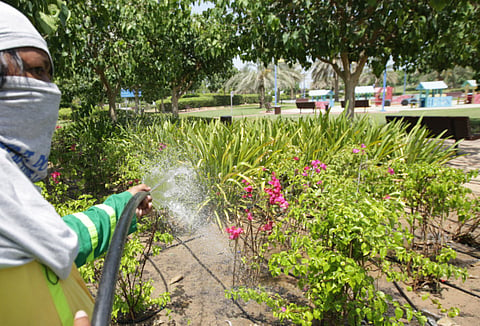Abu Dhabi to recycle, re-use all waste water by 2020
Growth of emirate’s population in last four decades also impacted the emirate’s environment negatively

Abu Dhabi: By 2020 Abu Dhabi will recycle and re-use all of its wastewater within the emirate, officials said on Monday.
As it stands now, Abu Dhabi currently reuses only five per cent of its treated wastewater while the emirate uses 60 per cent groundwater and 35 per cent desalinated water, Environment Agency-Abu Dhabi (EAD) revealed it in its “Environment Report 2017” in the capital.
Speaking to Gulf News on the sideline of the release at Masdar City, Dr Mohammad Dawoud, Water Resources Advisor at the EAD, said: “Our target is to recycle all of the discarded water of the emirate and re-use it for irrigation purposes as 60 per cent of our irrigation water comes from water wells.”
“Over the last decade, the emirate’s overall groundwater level has continuously declined, particularly in the Eastern Region. The sustainability of the emirate’s precious groundwater resources is one of the greatest sustainability challenges that the UAE faces,” the report said.
More than 115,000 water wells lie within the emirate, of which, 80 per cent are being utilised.
Twenty per cent have dried up, said Dr Dawoud.
“We are rejuvenating the dried wells using the latest technologies,” he said. “Our future plan is to increase the re-use of treated waste water. More than 360,000 cubic metres of treated waste water will be recycled and reused to replace the use of ground and desalinated water.”
Three projects are underway to re-use the treated waste water. By 2020, the emirate will be able to recycle and reuse all the treated waste water of the emirate, he said.
At present, more than 460,000 cubic metres of waste water are generated annually in the emirate, which increases by eight to 10 per cent each year, he said.
“The government has put in plans to recycle and reuse all waste water by 2020 and we aim not to lose a drop of waste water, he said.
The report also highlighted major environmental themes that include air quality, soil, water, fisheries, forestry and waste.
Population growth
About the report, Shaikh Hamdan Bin Zayed Al Nahyan, Ruler’s Representative in Al Dhafra, said, “Over last 40 years the emirate has registered unprecedented growth and since 1975 it has grown over 14 times.”
With this development there has been greater industrialisation, urbanisation, use of technology, transportation and consumables, water and energy. All these factors impacted our fragile natural environment negatively. We believe that our continued growth must be sustainable, Shaikh Hamdan said.
The report indicated that air quality of the emirate stands at 76 per cent, which it termed is “quite good”, while 85 per cent land is degraded.
The fisheries resources had a decline of 90 per cent in abundance in past 40 years and that was caused due to excessive fishing fleet, coastal development, desalination activities, pollution and climate change.
Household contribution
The report indicated that households are the major contributor to the UAE’s ecological footprint, followed by businesses/industry and government sectors, which is 30 per cent and 12 per cent respectively.
Shaikha Al Hosani, Executive Director for the environment quality at the EAD, told Gulf News, “Producing energy and water generate much pollution in the environment, which is generally based on the over-consumption of individuals and households mainly. That’s why, households’ share stand at 30 per cent in the ecological footprint in the emirate.”
However, the new electricity tariff system has helped in reducing it along with the awareness among homemakers, schools and the community, she said.



